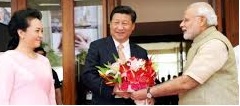
Chinese President Xi Jinping is on a three-day visit to India after six decades gets public welcome. His visit will focus on significantly ramping up trade and investment between the World’s largest exporter and emerging economy. The visit will also focus on the lingering historic bordering issues between the two countries. Since the late 1970s China has moved from a closed, centrally planned system to a more market-oriented one that plays a major global role – in 2010 China became the world’s largest exporter. Reforms began with the phasing out of collectivized agriculture, and expanded to include the gradual liberalization of prices, fiscal decentralization, increased autonomy for state enterprises, growth of the private sector, development of stock markets and a modern banking system, and opening to foreign trade and investment. China has implemented reforms in a gradualist fashion. In recent years, China has renewed its support for state-owned enterprises in sectors considered important to “economic security,” explicitly looking to foster globally competitive industries.
India is developing into an open-market economy, as Economic liberalization measures which began in 1990, including industrial deregulation, privatization of state-owned enterprises, and reduced controls on foreign trade and investment, designed to accelerate the country’s growth, which averaged under 7% per year from 1997 to 2011. India’s diverse economy encompasses Handloom industries, village farming, modern agriculture, handicrafts, a wide range of modern industries, and a multitude of services. Nearly half of the work force is in agriculture, but, services are the major source of economic growth, accounting for nearly two-thirds of India’s output with less than one-third of its labour force. India has capitalised on its large educated English-speaking population to become a major exporter of information technology services, business outsourcing services, and software workers. India’s economic growth began slowing in 2011 because of a decline in investment, caused by high interest rates, rising inflation, and the government’s non-commitment to further economic reforms and about the global situation. In late 2012, the Indian Government announced additional reforms and deficit reduction measures, including allowing higher levels of foreign participation in direct investment in the economy.
For the first time Indian PM Narendra Modi was receiving a foreign head of the state outside Delhi as he wanted to showcase Ahmedabad’s development to the visiting dignitary. Xi became the first Chinese leader since Zhou Enlai to be feted at a civic reception after the 1962 war.
